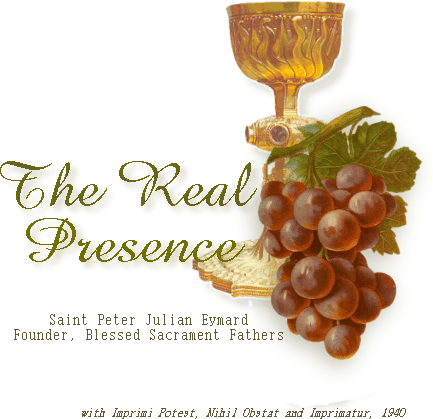

THE MOST BLESSED SACRAMENT IS NOT LOVED!
Tota die expandi manus Meas ad populum non credentem, et contradicentem.
All the day long have I spread My hands to a people that believeth not, and contradicteth Me. (Romans x. 21.)
I
ALAS! It is but too true: our Lord in the Most Blessed Sacrament is not loved!
He is not loved by the millions of pagans, by the millions of Jews and infidels, by the millions of schismatics and heretics who either know nothing of the Eucharist or have wrong notions of it.
Among so many thousands of creatures in whom God has placed a heart capable of loving, how many would love the Blessed Sacrament if they knew it as I do!
Must I not at least try to love it for them, in their stead?
Even among Catholics, few, very few love Jesus in the Most Blessed Sacrament. How many think of Him frequently, speak of Him, come to adore Him and receive Him?
What is the reason for this forgetfulness and coldness? Ah! They have never tasted the Eucharist, its sweetness, the delights of its love!
They have never known the goodness of Jesus!
They have no idea of the extent of His love in the Most Blessed Sacrament!
Some of them have faith in Jesus Christ but a faith so lifeless and superficial that it does not reach the heart, that it contents itself with what is strictly required by conscience for their salvation. And besides, these last are but a handful among so many other Catholics who live like real pagans, as if they had never heard of the Eucharist.
II
HOW is it that our Lord is so little loved in the Eucharist?
One reason is that we do not speak enough of it and that we insist only on faith in the presence of Jesus Christ in the Most Blessed Sacrament instead of speaking about His life and His love therein, instead of calling attention to the sacrifices which His love imposes upon Him, in a word, instead of showing Jesus Eucharistic with the personal and special love He has for each one of us.
Another reason is our behavior, which denotes little love in us. From the way we pray, adore, and visit Him, no one would suspect the presence of Jesus Christ in our churches.
How many among the best Catholics never pay a visit of devotion to the Most Blessed Sacrament to speak with Him from the heart, to tell Him their love! They do not love our Lord in the Eucharist because they do not know Him well enough.
But if in spite of knowing Him and His love and the sacrifices and desires of His Heart, they still do not love Him, what an insult! Yes, an insult!
For it amounts to telling Jesus Christ that He is not beautiful enough, not good enough, not lovable enough to be preferred to what they love.
What ingratitude! After having received so many graces from this good Savior, made so many promises to love Him, and offered themselves so often to His service, such a treatment of Him is a mockery of His love.
What cowardice! For if they do not want to know Him too well, to see Him at close quarters, to receive Him, to have a heart-to-heart talk with Him, the reason is they are afraid of being caught by His love. They fear being unable to resist His kindness; they fear being obliged to give in, to sacrifice their heart unreservedly, and their mind and life unconditionally.
They are afraid of the love of Jesus Christ in the Most Blessed Sacrament, and they avoid Him.
They are disturbed in His presence; they are afraid of yielding. Like Pilate and Herod, they avoid His presence.
III
WE DO not love our Lord in the Most Blessed Sacrament because we ignore or do not sufficiently look into the sacrifices made by His love for our sake. They are so amazing that the mere thought of them overwhelms my heart and fills my eyes with tears.
It cost our Savior the whole Passion to institute the Eucharist. How is that? Because the Eucharist is the sacrifice of the New Law. Now, there is no sacrifice without a victim, there is no immolation without the death of the victim, and to share in the merits of the sacrifice we must share in the victim by eating of it. All this takes place in the Eucharist.
It is an un bloody sacrifice because the Victim died once and, by that one death, made sufficient reparation and merited full justification; but the Victim perpetuates itself in its state of immolation so as to apply to us the merits of the bloody Sacrifice of the Cross, which is to last and to be reoffered to God until the end of the world. We must eat our share of the Victim; but if it were not in this state of death, we would be loath to eat it. We do not eat living things.
The Eucharist cost our Lord the agony in the Garden of Olives, the humiliations He had to undergo before the tribunals of Caiphas and of Pilate, and His death on Calvary. The Victim had to pass through all these immolations in order to reach the sacramental state and come to us.
By instituting His Sacrament, Jesus perpetuated the sacrifices of His Passion. He condemned Himself to undergo desertions as heart-breaking as the one He suffered in the Garden of Olives; the treachery of His friends and disciples who would become schismatics, heretics, and renegades and who would sell the Sacred Host to the Jews and sorcerers.
He perpetuated the denials that distressed Him in the house of Annas; the sacrilegious fury of Caiphas; the scorn of Herod; the cravenness of Pilate; the shame of seeing a passion, an idol of flesh, preferred to Him, as He had seen Barabbas; the sacramental crucifixion in the body and in the soul of the sacrilegious communicant.
Well, our Lord knew all this beforehand. He was acquainted with all the new Judases; He counted them among His own, among His well-beloved children. But nothing of all this could stop Him; He wanted His love to go further than the ingratitude and malice of man; He wanted to outlive man's sacrilegious malice.
He knew beforehand the lukewarmness of His followers: He knew mine; He knew what little fruit we would derive from Holy Communion. But He wanted to love just the same, to love more than He was loved, more than man could make return for.
Is there anything else? But is it nothing to have adopted this state of death when He has the fullness of life, a glorified and supernatural life? Is it nothing to be treated and considered as one dead? In this state of death Jesus is without beauty, motion or defense; He is wrapped in the Sacred Species as in a shroud and laid in the tabernacle as in a tomb. He is there, however; He sees everything and hears everything. He submits to everything as though He were dead. His love casts a veil over His power, His glory, His hands, His feet, His beautiful face and His sacred lips; it has hidden everything. It has left Him only His Heart to love us and His state of victim to intercede in our behalf.
At the sight of so much love of Jesus Christ for man, who is so thankless for it, the devil seems triumphant; he mocks Jesus. "I give man nothing that is true, good, or beautiful," he says. "I have not suffered for his sake, and I am more loved, more obeyed, and better served than Thou."
Alas! It is but too true; our coldness, our ingratitude are Satan's triumph over God!
Oh! How can we forget our Lord's love, a love that cost Him so much and is so lavish of everything!
IV
IT IS true also that the world does all in its power to prevent us from loving Jesus in the Must Blessed Sacrament with a real and practical love, to prevent us from visiting Him, and to cripple the effects of this love.
The world engrosses the attention of souls; it binds and enslaves them with external occupations and good works in order to deter them from dwelling too long on the love of Jesus.
It even fights directly against this practical love and represents it as optional, as practicable at most only in a convent. And the devil wages incessant warfare on our love for Jesus in the Most Blessed Sacrament.
He knows that Jesus is there, living and substantially present; that by Himself He is drawing souls and taking direct possession of them. The devil tries to efface the thought of the Eucharist in us, and the good impression made by it; for in his mind, that should decide the issue of the struggle.
And yet God is all love. This gentle Savior pleads with us from the Host: "Love Me as I have loved you; abide in My love! I came to cast the fire of love on the earth, and My most ardent desire is that it should set your hearts on fire." Oh! What shall we think of the Eucharist at the moment of death or after death, when we shall see and know all the goodness and love and riches of it!
O my God, my God! What must Thou think of me, who have known Thee so long, who have communicated so often! Thou hast given me all Thou couldst give me.
Thou wantest me to serve Thee in return, and I have not yet acquired the first virtue of this service.
Thou art not yet the sovereign law, the center of my heart, the goal of my existence.
What then must Thou do to triumph over my heart?
Lord, my mind is made up; henceforth my motto shall be, "Give me the Eucharist, or let me die!"
 Contact Us
Contact Us
HOME---------------THE HOLY EUCHARIST DIRECTORY-----------------------BLESSED SACRAMENT VISITS
www.catholictradition.org/Eucharist/real-presence29.htm